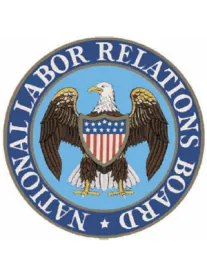In a sweeping decision that overrules several of their precedents, the National Labor Relations Board (NLRB) has decided that it no longer will apply “setting-specific” standards for determining when an employee’s abusive conduct loses the protection of the National Labor Relations Act (NLRA). General Motors LLC, 369 NLRB No. 127 (2020).
The NLRB modified its standard for determining whether an employee has lost the protection of the NLRA and been lawfully disciplined or discharged after making abusive or offensive comments in work-related situations. The decision will be applied retroactively “to all pending cases in which the Board would have determined, under one of its setting-specific standards, whether abusive conduct in connection with section 7 activity had lost an employee or employees the Act’s protection.”
Background
On April 11, April 25, and October 6 of 2017, employee Charles Robinson was disciplined for using invective toward management personnel while engaging in protected concerted activity protected by Section 7 of the NLRA. He filed unfair labor practice charges alleging the discipline violated the NLRA. After a trial, an NLRB Administrative Law Judge (ALJ) decided the employer had violated the NLRA only in connection with its discipline of Robinson for his April 11 conduct.
Appeal and Notice and Invitation to File Briefs
The employer appealed that aspect of the decision to the NLRB. While the appeal was pending, the NLRB issued a “Notice and Invitation to File Briefs.” The Notice asked the parties and the public to address several questions, including:
-
“Under what circumstances should profane language or sexually or racially offensive speech lose the protection of the Act”;
-
“[T]o what extent should employees be granted some leeway when engaged in Section 7 activity to use profanity or language that is offensive to others on the basis of race or sex”;
-
Should the NLRB “adhere to, modify, or abandon the standard the Board applied in [several of its decisions] to the extent it permitted a finding in those cases that racially or sexually offensive language on a picket line did not lose the protection of the Act”; and
-
“[W]hat relevance should the Board accord to antidiscrimination laws such as Title VII in determining whether an employee’s statements lose the protection of the Act.”
Previous Standards Criticized
The NLRB reversed the ALJ. In its decision, the NLRB observed it has applied different standards to employee conduct in different settings. Its Atlantic Steel Co., 245 NLRB 814 (1979), decision applied to “outbursts to management in the workplace.” A different standard was applied to social media posts “and most cases involving conversations among employees in the workplace.” Pier Sixty, LLC, 362 NLRB 505 (2015). In connection with picket-line conduct, the NLRB applied another standard, found in Clear Pine Mouldings, Inc., 268 NLRB 1044 (1984).
The NLRB criticized its inconsistent decisions under Atlantic Steel. It also noted that the decision raised “serious concerns that the Board is giving little, if any, consideration to employers’ right to maintain order and respect.” Atlantic Steelprovided a four-factor test; the NLRB found that a “problem with that test is that the second factor—the subject matter of the discussion—always tilts the scale in favor of employees retaining protection for abusive conduct ….” The NLRB found that, since Atlantic Steel “only applies when the subject matter of the discussion is related to Section 7 activity,” the “standard [is] predisposed to favoring protection in each case ….”
Regarding its totality-of-the-circumstances test, the NLRB noted its concerns that it did not “adequately balance[] an employer’s interests,” and, like Atlantic Steel, leads to “inconsistency and unpredictability ….”
The NLRB criticized Clear Pine Mouldings because it permitted “appallingly abusive picket-line misconduct to retain protection, including racially and sexually offensive language.” It also noted that the “setting-specific” standards are in tension with an employer’s duty to comply with anti-discrimination laws when the employees’ conduct involves comments based on race, color, religion, sex, national origin, age, and disability.
General Motors
In General Motors, the NLRB concluded these tests had strayed from the precepts of the NLRA, which call for a determination of whether an employee would have been discharged for the conduct regardless of their actions or expressed sentiments in favor of unions or other protected conduct. The NLRB decided that its landmark Wright Line decision is the proper standard to apply for deciding cases “where employees engage in abusive conduct in connection with Section 7 activity, and the employer asserts it issued discipline because of the abusive conduct.” Wright Line, 251 NLRB 1083 (1980). Under that decision, the NLRB General Counsel (GC) has an initial burden. If the GC meets his burden, the employer must prove that it would have taken the same action even in the absence of the Section 7 activity.
The NLRB determined that it would apply Wright Line in these cases “regardless of the setting involved, whether it be a workplace, social media, or picket line.” It remanded the case to the ALJ to take additional evidence regarding how Wright Line applies to the case. (The parties had only elicited evidence regarding facts that were relevant under Atlantic Steel.)
Implications
This decision is a victory for civility in the workplace. Employers will remain subject to the Wright Line test, under which the employer must demonstrate that an employee engaging in unacceptable behavior would have been terminated (or disciplined) regardless of their engaging in any Section 7 activity. For example, if an employer tolerates low-level vulgarity on an ongoing basis in its work environment, and an employee who favors the union utilized the same low-level vulgarity is discharged, it may be difficult to defend that termination decision since others who have not engaged in protected activity did not suffer a similar consequence.
Before disciplining employees for engaging in abusive conduct, employers should determine whether the employee was involved in protected concerted activity while doing so and whether the employee would have been disciplined even if they were not engaged in protected concerted activity.






 />i
/>i

